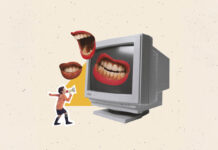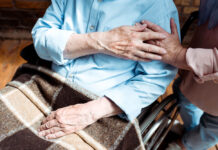A new study documents the negative impacts of involuntary hospitalization for youth experiencing mental health challenges. Researchers, led by Nev Jones from the University of South Florida, found that young people who were hospitalized for mental health reasons against their will experience the treatment as punitive and report high levels of distrust for mental health providers. The study was published in the journal Social Psychiatry and Psychiatric Epidemiology.
One participant put it this way:
“…being [involuntarily hospitalized] that one time was enough to make me shut out all help from figures like therapists and school workers, my parents, for fear of going back to that place. I’ve had nightmares about it. So it really only caused me to shut in on myself further, and force out their help rather than look for it and accept it.”
 The existing literature indicates that hospitalization during youth may “trigger or reinforce stigma apprehension, diminish trust in providers, detrimentally impact self-worth and other aspects of emerging identity, and disrupt peer and school relationships.” It can increase the risk of suicide, and is linked to economic deprivation, and may increase the risk of acquiring and developing complications related to COVID-19.
The existing literature indicates that hospitalization during youth may “trigger or reinforce stigma apprehension, diminish trust in providers, detrimentally impact self-worth and other aspects of emerging identity, and disrupt peer and school relationships.” It can increase the risk of suicide, and is linked to economic deprivation, and may increase the risk of acquiring and developing complications related to COVID-19.
Little is known, however, on the long-term impact of involuntary hospitalization on youth, especially in terms of their attitudes toward engaging with mental health care services following the hospitalization. To investigate these potential effects, the authors used a grounded theory approach to conduct an in-depth exploration of young people’s experiences of involuntary hospitalization and the impact of these experiences once discharged.
The researchers conducted in-depth interviews with 40 young people, aged 16-27, who had experienced at least one instance of Involuntary hospitalization. Over half of the participants identified as a member of an ethnic/racial minority group.
As the authors write:
“The theme of (dis)trust following involuntary hospitalization emerged as our organizing phenomenon.”
In total, 70% of participants reported negative impacts on their ability or willingness to trust others, especially mental health providers, and in some cases other authority figures.
Varying negative experiences of involuntary hospitalization included dehumanization and punishment rather than care, unmet expectations, and unaddressed distress, and minimal or avoidant post-discharge engagement with mental health services. The consequences of these experiences included “unwillingness to seek help in the future even if suicidal.”
While previous research finds an inverse relationship between perceived procedural injustice during hospitalization and the “therapeutic alliance” with care providers, this study elaborates on these research findings, revealing that “the perception of hospital staff and policies as not just disrespectful or unfair but explicitly ‘punitive’ played an especially strong role in shaping participants’ experiences and their subsequent impact.”
These findings highlight the potential negative impact of involuntary hospitalization on youth trust and willingness to seek care for future mental health challenges and underscores the need to transform or abolish the punitive environments that purport to offer care.
****
Jones, N., Gius, B.K., Shields, M. et al. Investigating the impact of involuntary psychiatric hospitalization on youth and young adult trust and help-seeking in pathways to care. Soc Psychiatry Psychiatr Epidemiol (2021).















Youth are never honestly told that what they experience is normal. And so
why should youth expose themselves to being told that what they experience
is an illness.
Everyone knows that the result of the “mental health” brainwashing industry is leading
to misery and deaths. Everything from help lines to therapy to shrinks are dangerous
territory. Nothing “healthy” about the industry.
Report comment
“Involuntary Hospitalization Deters Youth from Seeking Mental Healthcare,” it likely deters people of all ages from seeking “mental healthcare.” Since once the “therapeutic” relationship is gone, it is gone. Once one has experienced, first hand, the criminal and violent nature of forced treatment, one wants nothing to do with any of the “mental health,” or even mainstream medical, thugs. But that’s one more reason why forced treatment should be made illegal.
However, it should be mentioned that force treatment is illegally being used by the criminal doctors, like this, now FBI convicted, one.
https://www.justice.gov/usao-ndil/pr/oak-brook-doctor-convicted-kickback-scheme-sacred-heart-hospital
Who illegally force treated me for a non-existent “chronic airway obstruction,” according to medical records. Because he – and his psychiatric “snowing” partner in crime – had hoped to have an unneeded tracheotomy done on me, for profit. Or murder me for parts, since I used to be an organ donor? I can’t be totally certain of their nefarious motives.
Nonetheless, forced treatment should be made illegal.
Report comment
Is this an attempt to find something good about forced psychiatry? Sort of like how getting burned deters one from putting their hands on the stove?
Report comment
So you mean handcuffing someone and forcing them into a patrol car, dropping them in a locked “ward” and strapping them to a bed and forcibly injecting them with a drug that makes them feel half dead, discourages them from seeking out similar experiences in the future?
Report comment
If at first you don’t succeed…
Report comment
That sounds like a pretty out there claim. Surely we need more data on that.
Let’s try with some psychiatrists.
Report comment
This site would be a gold mine for someone doing a research paper on irony.
Report comment
Neuroleptic drugs were originally reported as “good” because they caused sedation, and made the crazies easier to handle/control. Stimulants are helpful by definition because they get kids to sit down and shut up.
In psych drug measurements complaining about drug effects, health, and so on is a sign of illness and requires more drugs.
The fact that psychiatry in whole causes people to socially isolate, avoid the medical system, reduce socialization, and become stigmatized is a feature not a bug. Just like how they describe brain damage from the drugs and electrocution as “healing”. It’s healing in the sense that the patient is less capable to complain and can be ignored.
Report comment
The article refers to the involuntary hospitalization of “youth” which I at first expected to be kids under the age of 18. But it seems like it was mostly young adults unless a lot of those interviewed were in the 16-17 age range. Or maybe it was referring to experiences far in their pasts. Either way, these results should be self-evident across the entire age span. But it’s good to see studies like this published for the mental health professionals and many in the general public for whom logic and reason appear to be inaccessible.
Report comment